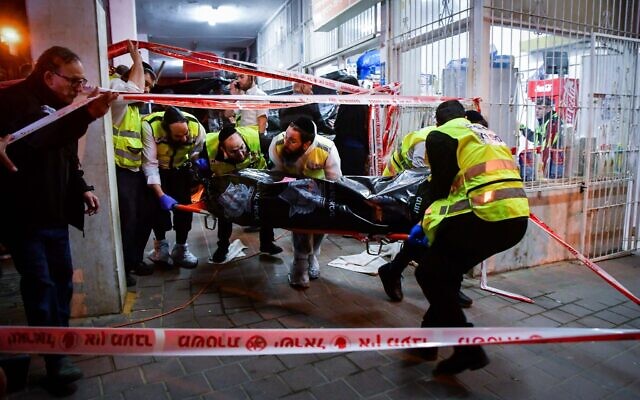
Why ‘lone wolves’ behind latest terror spree pose such a challenge to Israeli intel
The 28-year-old Palestinian terrorist from Jenin who murdered three Israeli civilians and injured several others in the heart of Tel Aviv on Thursday night is the latest deadly example of the challenge posed by unaffiliated lone terrorists or localized small cells: They often leave only a narrow trail for Israel’s intelligence net to try, desperately, to pick up in time.
Ra’ad Hazem had no clear organizational affiliation, according to the Shin Bet’s initial investigation. He appeared, however, to have local assistance in entering Israel illegally and preparing for the attack.
This is similar to that of Diaa Hamarsheh, the Palestinian terrorist who entered Israel illegally from the West Bank village of Ya’bad near Jenin and went on a shooting rampage in Bnei Brak near Tel Aviv on March 28, murdering five people.
Despite claims by Palestinian factions seeking to leverage Hamarsheh’s attack to boost their standing in the Palestinian street, his actions, too, were an example of a localized terror initiative.
The Arab Israeli terrorists who struck last month in Hadera and Beersheba in the name of the murderous jihadist ISIS ideology acted without any external organizational orchestration as well.
Each terror incident provides “inspiration” for the next, setting off a chain reaction that becomes all the more combustible due to the extremism that often rears its head during the Muslim holy month of Ramadan, and the unending incitement to violence and hatred that is being disseminated by Hamas, Palestinian Islamic Jihad and other radical elements on Palestinian social media.
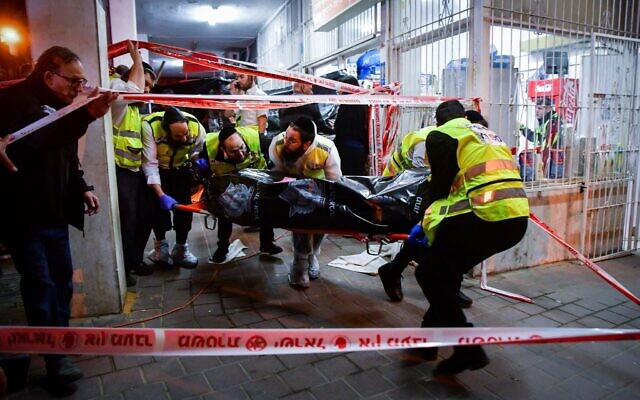
Members of the Zaka emergency organization remove a body from the scene of a terrorist attack in Bnei Brak, March 29, 2022. (Avshalom Sassoni/Flash90)
Hamas’s tactic
Hamas has an interest in seeing Jerusalem, Israel and the West Bank catch fire, which would both serve its ideology of attacking Israel and weaken its arch domestic foe, the Palestinian Authority. But it does not have an interest at this time in directly involving the Gaza Strip in that escalation, since it wants more time to rebuild its military capabilities and damaged civilian infrastructure.
The absence of rockets and even arson balloons from Hamas-run Gaza underlines this distinction, as do recent media reports, according to which a firefight erupted between Palestinian Islamic Jihad and Hamas members due to the former’s attempt to fire rockets at Israel and the latter’s determination to avoid a direct confrontation with Israel for now.
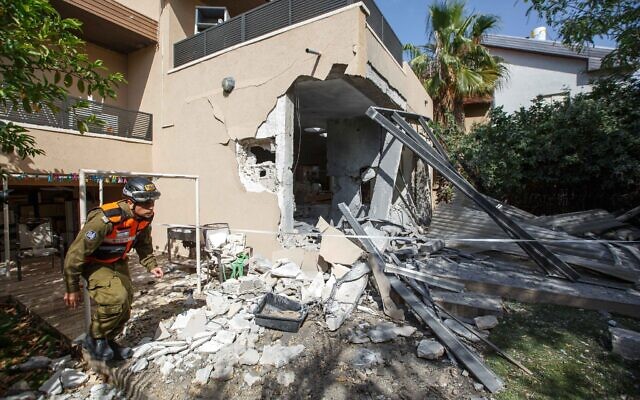
A soldier from the Israeli military’s Home Front Command walks outside a house in the southern Israeli city of Ashkelon that had been struck by a Hamas rocket on May 20, 2021. (Edi Israel/FLASH90)
As a result, Israel’s defense establishment is employing an approach to the wave of attacks that is based on isolating the three arenas – Gaza, inside Israel and the West Bank – from one another as much as possible.
The overarching objective is to boost stability in the region, and this is an interest that is shared by the Palestinian Authority, which is why its president, Mahmoud Abbas, has issued condemnations of both the Tel Aviv and Bnei Brak attacks.
Those condemnations are not enough, however, to counteract the disturbing incitement coming from members of Abbas’s own Fatah faction, some of whom are openly defiant of the PA’s controlling status in the West Bank. A case in point are statements by the Tel Aviv terrorist’s own father, a senior former PA security forces officer, hailing his son’s murderous actions.
Nevertheless, the PA is interested in seeing Ramadan pass off as quietly as possible. Its security forces continue to coordinate with the IDF and with the Israeli Coordinator of Government Activities in the Territories, in an effort to keep West Bank cities quiet and prevent attacks. Where these efforts fail, Israel’s stepped-up counter-terrorist operations step in to try to fill the gaps.
Israel’s approach
Much as it did when tackling the 2015-2016 wave of unorganized terrorism, the Israeli defense establishment has been promoting an approach based on surgical counter-terrorist actions and the intense targeting of the immediate supporting environments of terrorists, while providing an easing of civilian conditions for the majority of Palestinians who are uninvolved in the terrorism.
This means taking bold action against ticking bombs, such as Israel’s counter-terror operation against a three-man Palestinian Islamic Jihad cell in the northern West Bank on April 2, which intercepted the cell en route to an attack and neutralized its members in a firefight.
Security forces have also flooded hotspots like the security barrier zone.
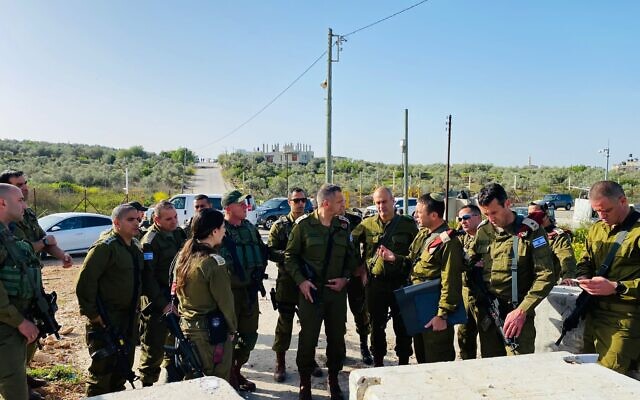
Military chief Aviv Kohavi tours the West Bank security barrier, April 1, 2022. (Israel Defense Forces)
The strategy is also based on the analysis that Israel is facing a chain reaction of attacks that, while they inspire each other, are not guided by a single entity. The goal of cutting the sequence, therefore, employs tactics aimed at returning the situation to what it was prior to the latest surge in terrorist attacks.
So far, this has meant not revoking work permits for the more than 100,000 Palestinians legally allowed to work in Israel. The mission of sealing off gaps in the security fence, meanwhile, has become more urgent than ever.
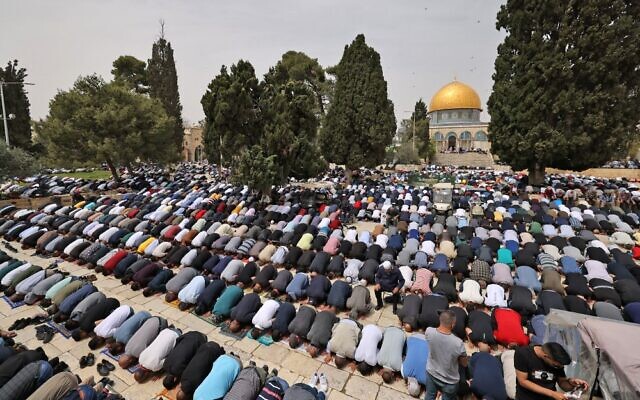
Palestinians attend afternoon prayers on the Temple Mount, which houses the Al-Aqsa Mosque, in Jerusalem’s Old City on April 8, 2022, during the first Friday of the Muslim holy month of Ramadan. (Ahmad Gharabli/AFP)
Yet with every new attack, the ability of Israel’s government to continue to greenlight the lifting of civilian restrictions, including letting many West Bank Palestinians worship at Al-Aqsa Mosque, becomes more difficult.
The Shin Bet intelligence agency, which thwarts on average between 500 to 600 terror attacks per year, including hundreds of planned shootings, has a familiar challenge on its hands — being able to flag lone attackers before they strike.
The use of advanced social media monitoring was a central tool in achieving this during the 2015-2016 escalation, and, it is fair to assume, is being called upon once again to prevent fresh attacks today.
Security forces have made some 200 preventative arrests in recent days. But while the new security campaign has seen some results, Thursday’s Tel Aviv attack underlines the difficulty in thwarting unorganized terrorism, and the devastating consequences when the effort to do so fails.
